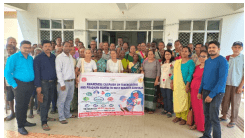As part of the TB Mukt Bharat Abhiyan, the District TB Centre of Dr. R.P. Hospital, Mayabunder organized a Nikshay Shivir at Ayushman Arogya Mandir, Karmatang, on August 28. The outreach was designed to target vulnerable sections of the population in a remote area, extending the campaign’s efforts beyond hospitals and into the community.
During the camp, a total of 54 individuals were screened by the medical team led by the District TB Officer. Among them, 50 were found to be asymptomatic while four displayed symptoms. To ensure comprehensive follow-up, 46 individuals were mobilized from Karmatang to Dr. R.P. Hospital using the STS bus service, where they underwent diagnostic evaluations including X-rays and sputum examinations. This ensured that those potentially at risk could be examined under proper medical supervision.
The camp combined medical screening with awareness-building exercises. Officials from the National TB Elimination Programme (NTEP) educated participants about the importance of early detection, adherence to treatment regimens, and preventive practices. By addressing misconceptions and providing factual information, the program aimed to build confidence and awareness among local residents.
Such initiatives are considered critical in India’s fight against tuberculosis, which remains a public health challenge despite improvements in healthcare infrastructure. Rural and remote communities are particularly vulnerable due to limited access to health facilities and information. Bringing services closer to such populations increases the likelihood of early detection and treatment, reducing both disease burden and transmission.
The Nikshay Shivir model is also significant because it combines screening, awareness, and immediate referral in one program. Instead of leaving individuals to seek diagnostic services on their own, the system ensures that symptomatic cases are directly linked to medical institutions. This reduces the gap between detection and treatment, which is often the most vulnerable stage in TB management.
In the context of the Andaman and Nicobar Islands, where transportation and access remain challenges, the provision of STS bus services for mobilization illustrates the program’s commitment to inclusivity. By ensuring that all participants reached the hospital for diagnostic procedures, the organizers closed a critical loop in the chain of TB control.
The camp also contributed to broader goals of the TB Mukt Bharat Abhiyan, which envisions eliminating tuberculosis from India. Local initiatives like the one at Karmatang are essential to achieving national targets, as they focus on grassroots engagement and practical service delivery. The involvement of district hospitals and community-level institutions adds strength to the national mission.
For the people screened at the camp, the event provided both reassurance and practical support. Those who were asymptomatic gained awareness about preventive steps, while symptomatic individuals received timely referral for further diagnosis. This dual impact helps in building community-level resilience against the disease.
The successful completion of the Nikshay Shivir demonstrated that coordinated efforts between healthcare teams, community facilities, and transport services can bring measurable results. By combining awareness, screening, and diagnostics, the program not only contributed to TB control but also reinforced the principle of healthcare access for all.





